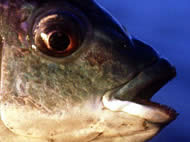
Alien visitor... or dinner?
It might not match the thrills of alien body-invaders-from-outer-space horror movies, but the United Nations Food and Agriculture Organization (FAO) is issuing an expanded database to warn of the unintended dangers that can arise from introducing non-endemic species into different regions of the world, especially alien fish farming.
While some such alien introductions have been widely beneficial, like transplanting the potato from the New World to Europe, or the wide human-generated migration of crops and animals such as maize, coffee, tomatoes, sugar cane, turkeys, cows, sheep and the African tilapia fish, becoming global staples, others have had far more malignant impacts.
Consider the voracious Nile Perch, introduced to Lake Victoria in the 1950s, that has now been blamed for causing the extinction of several hundred native species, although it is a major source of income for lakeshore communities, with exports to Europe valued at around €170 million (euros) a year.
Or the golden apple snail, brought to the Philippines and other Asian countries in the early 1980s, that is easy to rear and fast breeding, with a high protein content that would seem to make it an ideal supplement to the diets of rural poor as well as a product for export. Unfortunately, not only did the snails not take off with consumers, but they escaped into irrigated rice fields, evolving into a major pest and devouring thousands of hectares of young rice.
"The idea is to make people aware of the benefits and risks of introducing a given species into a specific area, as well as international regulations governing those introductions, so that they can avoid mistakes and make good, and legal decisions," FAO Fisheries Department official Devin Bartley said of the expanded database available of CD-ROM which focuses especially on species used in aquaculture, or fish farming.
"Introductions shouldn't happen without a precautionary risk/benefit analysis being conducted ahead of time. Our goal with this CD-ROM package is to provide a tool for doing that."
New fish species can also bring with them new diseases, to which native stocks have no resistance. The shrimp farming industry in Taiwan Province of China was nearly wiped out in the early 1990s when that happened. There are other examples of aliens changing habitats, competing with or feeding on local species, or breeding with their relatives and causing a form of genetic pollution.
FAO started its tracking in the 1980s, monitoring only inland fish species, around 1,300 in all. But as world appetite for fish continued to grow both in terms of net demand as well as demand for greater diversity, more species became farmed, and FAO started collecting information on marine species and species other than fish.
The newly launched expanded database now includes introductions of all taxa being produced via aquaculture, with over 5,000 records of introductions of several hundred species. The CD-ROM also includes a virtual library of reports and studies by FAO.
The expansion was largely funded from FAO's regular working budget and the FishCode Project, but vital support also came from the Netherlands via the FAO-Netherlands Partnership Programme (FNPP).
